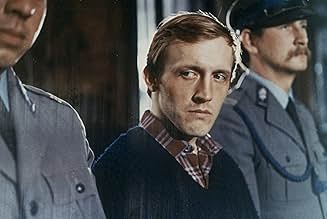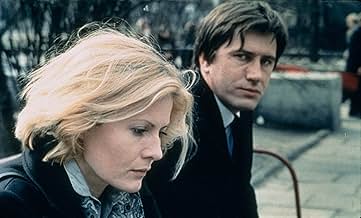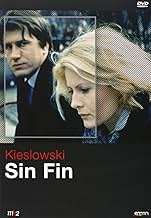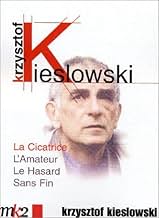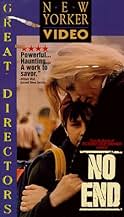IMDb RATING
7.3/10
6.2K
YOUR RATING
The wife of the recently deceased lawyer tries to cope with grief after his loss and to keep his last case going in court.The wife of the recently deceased lawyer tries to cope with grief after his loss and to keep his last case going in court.The wife of the recently deceased lawyer tries to cope with grief after his loss and to keep his last case going in court.
- Director
- Writers
- Stars
Danny Webb
- American
- (as Daniel Webb)
Jacek Domanski
- Dzialacz opozycji
- (uncredited)
- Director
- Writers
- All cast & crew
- Production, box office & more at IMDbPro
7.36.1K
1
2
3
4
5
6
7
8
9
10
Featured reviews
Mezmerising
I state for the record that I did not understand this film fully. The second plot with Solidarnost protester imprisoned and released by the court is not completely clear to me. Yet it has little to do with politics and more with human condition (ideals, expectation, compromise). Prisoner's family doesn't react happily upon his immediate release in a court room. There is awkwardness and embarrassment in that scene, as if some unforgivable compromise has been made and it tainted all of their relationship. Accident scene with a death of motorist seems random but reoccurring theme in Kieslowskij movies. Randomness of death, randomness of existence. Movie is wonderfully shot , music (as always) is haunting. I just cannot put it all together in my mind like I could with Veronique.
No 30
Grazyna Szapolowska's husband dies. He was a public defender, so she tries to arrange for his last client, Artur Barcis, to have a good defendant. She arranges for Aleksander Bardini, under whom her husband had apprenticed, to take the case. Barcis is accused of having led an illegal strike, and Bardini works to have him tread the middle ground of confessing and denial.
Krzysztof Kieslowski's movie is a murky one that tells us we can never tell what is going on at the moment. Only in retrospect can we figure out what was going on, and even that may not be true. It is a gloomy movie, with a lot of motivation left unclear. Did Miss Szapolowska really love her husband? Why has Bardini, who hasn't taken a case of this sort for more than 30 years, taken this one? What was the strike actually about? That remains uncertain, even after the movie's end.
Krzysztof Kieslowski's movie is a murky one that tells us we can never tell what is going on at the moment. Only in retrospect can we figure out what was going on, and even that may not be true. It is a gloomy movie, with a lot of motivation left unclear. Did Miss Szapolowska really love her husband? Why has Bardini, who hasn't taken a case of this sort for more than 30 years, taken this one? What was the strike actually about? That remains uncertain, even after the movie's end.
no end
...and not much of a middle, either. Beginning's pretty good, though. Is it just me or is TCM Imports, under Alicia Malone, grimly determined to show every single heavy, stolid, dull, depressing film from Mr. Kieslowski? Just one solid, grey, bleak, enervating shroud until I finally cried "wystarczajaco" right around the time Antec's lovely, grieving widow, for reasons best known to Kieslowski and herself, decides to sleep with a random English dude she picks up in a bar. If I were a cynical sort I'd say that the dour Pole had a commercial side to his foreboding personality as I'm sure the sight of Grazyna Szapolowska's luscious bod did not exactly discourage ticket sales. God knows, you need something to quicken the ol pulse as you watch this bloodless bunch, cigarettes stuck firmly in their mugs, stare into the abyss, weep, occasionally crack a bitter joke and stare some more. For awhile, I was hoping that there would be some courtroom drama since the plot seemed to involve a lawyer trying to free a political prisoner. But at the film's halfway mark nary a judge, jury or executioner were to be found. Unless, of course, you see Kieslowski as the hangman of all that is dramatically compelling. C plus.
Bewildered epiphany
I've began to follow Kieslowski over the past days, hoping to finally encounter his color films which I've seen for years pop up among the brilliant works. I watched this as background glimpse into his formative period. Interestingly he does two things:
One is he presents a world that has come undone and carries the past. A woman, her husband has died as the film begins, life has broken down and she has to go out and face it. Everything that she encounters is an echo from the past. Two instances that involve photos exemplify it; nude photos of her that her husband had found but he's now gone before she had a chance to explain, the other shows an idyllic summer that he possibly spent with another woman (before they met?). But also an old friend who now vies for her, a night of prostituting herself because he reminds her of her husband, being hypnotized to forget him conjures his presence, and round it goes from bewilderment to epiphany.
The other thing they do here is look to frame a response to bewilderment felt by Poles who had just been through strikes and martial law. A man is awaiting trial, different narratives are offered up by lawyers. Should he be pragmatic or protest? It's one of the threads that were left undone at the time of the husband's death who was a lawyer on the case. His own advice, which I perceive to be Kieslowski's, is for everyone to remove the distortions that prevent them from seeing each other.
Viewers who are content to encounter a life of episodic confusion will be happy with what he does. I miss a more penetratingly visual way of threading these events and, already from my brief glimpses into Dekalog, I believe it's this ability to surround and submerge causality that he's going to cultivate, a way of dreaming in advance. Here, tellingly, we have the husband announcing his own death in the very first shot whereas it could have been threaded as discovery and glimpsed in a haze (he already tries this by the first episode of Dekalog).
One is he presents a world that has come undone and carries the past. A woman, her husband has died as the film begins, life has broken down and she has to go out and face it. Everything that she encounters is an echo from the past. Two instances that involve photos exemplify it; nude photos of her that her husband had found but he's now gone before she had a chance to explain, the other shows an idyllic summer that he possibly spent with another woman (before they met?). But also an old friend who now vies for her, a night of prostituting herself because he reminds her of her husband, being hypnotized to forget him conjures his presence, and round it goes from bewilderment to epiphany.
The other thing they do here is look to frame a response to bewilderment felt by Poles who had just been through strikes and martial law. A man is awaiting trial, different narratives are offered up by lawyers. Should he be pragmatic or protest? It's one of the threads that were left undone at the time of the husband's death who was a lawyer on the case. His own advice, which I perceive to be Kieslowski's, is for everyone to remove the distortions that prevent them from seeing each other.
Viewers who are content to encounter a life of episodic confusion will be happy with what he does. I miss a more penetratingly visual way of threading these events and, already from my brief glimpses into Dekalog, I believe it's this ability to surround and submerge causality that he's going to cultivate, a way of dreaming in advance. Here, tellingly, we have the husband announcing his own death in the very first shot whereas it could have been threaded as discovery and glimpsed in a haze (he already tries this by the first episode of Dekalog).
No equal
Krystoff Kieslowski is today best known for his last four films, made wholly or partly in France, which in some ways is a shame, as while these movies are not without merit, they are outshone by the massive brilliance of his earlier, Polish work. Kieslowski was, of course, the greatest visual poet of communist architecture; and there's also something magical about the way he communicates the most intense emotion behind the facade of Slavic stoicism (witness, for example, in this film, the scene where the car is taken by the police). And also there was the subtext of the political beneath the personal, never more apparent than in 'No End', set (and, courageously, made) in the aftermath of the impact of the Solidarity movement on Polish society. In the face of civil unrest, the government had declared martial law, hoping to stave off a "friendly" Russian invasion; but system had lost confidence in itself, and had already effectively negotiated its own demise by the time the collapse of the Berlin wall finally cast it into oblivion. It's in this intermediate period, where normality intermingled with fear, that 'No End' unfolds, a drama that combines moral complexity and human sympathy in equal measure.
The first words of dialgoue in this film are "I died". Billy Wilder had planned to start 'Sunset Boulevard' in a similar manner, but the suits didn't like it and that film makes less sense as a result of the changes they demanded. More recently, films like 'Truly, Madly, Deeply' and 'The Sixth Sense' have repeated one idea explored in 'No End', that of the ongoing relationship between the living and the dead. But whereas both of those films are weighted down by obvious sentimentality, the opening speech in 'No End' is simple, disturbing, painfully real and yet leads naturally into something far more than a ghost story, a tale in which there is no right and wrong, but in which the mixed motives of the characters only illuminate their humanity.
Kieslowski is famous for his collaboration with Zbigniew Priesner, who wrote wonderful scores for this film (and all it's successors); but watching it, one is also struck by how well he used silence. He also had a talent for finding the most wonderfully expressive faces: the lawyer (Aleksander Bardini), the wife (Grazyna Szapolowska) and the client (Artus Barcis) all went on to appear in his 'Dekalog'. It's impossible to imagine a better actor than Bardini for his role; while Szapolowska appears more beautiful than any Hollywood starlet precisely because of the complete lack of glamour with which she is shot; her portrayal of a woman holding things together in the face of an unconquerable grief is wonderful and immensely sad.
There are so many moments of brilliance in this film, almost of all them unflaunted; the moment where the woman's son interrupts her phone call; the tiny flinch induced when a door closes behind her, the way that light floods a previously darkened room; the speech of introduction uttered by the lawyer; Kieslowski constantly finds the subtlest of ways to shed light on his subjects. This is a ten star film, made by a master, grounded in its era but which speaks of so much more. Now released on DVD, it has to be seen.
The first words of dialgoue in this film are "I died". Billy Wilder had planned to start 'Sunset Boulevard' in a similar manner, but the suits didn't like it and that film makes less sense as a result of the changes they demanded. More recently, films like 'Truly, Madly, Deeply' and 'The Sixth Sense' have repeated one idea explored in 'No End', that of the ongoing relationship between the living and the dead. But whereas both of those films are weighted down by obvious sentimentality, the opening speech in 'No End' is simple, disturbing, painfully real and yet leads naturally into something far more than a ghost story, a tale in which there is no right and wrong, but in which the mixed motives of the characters only illuminate their humanity.
Kieslowski is famous for his collaboration with Zbigniew Priesner, who wrote wonderful scores for this film (and all it's successors); but watching it, one is also struck by how well he used silence. He also had a talent for finding the most wonderfully expressive faces: the lawyer (Aleksander Bardini), the wife (Grazyna Szapolowska) and the client (Artus Barcis) all went on to appear in his 'Dekalog'. It's impossible to imagine a better actor than Bardini for his role; while Szapolowska appears more beautiful than any Hollywood starlet precisely because of the complete lack of glamour with which she is shot; her portrayal of a woman holding things together in the face of an unconquerable grief is wonderful and immensely sad.
There are so many moments of brilliance in this film, almost of all them unflaunted; the moment where the woman's son interrupts her phone call; the tiny flinch induced when a door closes behind her, the way that light floods a previously darkened room; the speech of introduction uttered by the lawyer; Kieslowski constantly finds the subtlest of ways to shed light on his subjects. This is a ten star film, made by a master, grounded in its era but which speaks of so much more. Now released on DVD, it has to be seen.
Did you know
- TriviaThe film takes place in 1982.
- Quotes
[First lines]
Antek Zyro: [speaking directly to the camera] I died - four days ago.
- How long is No End?Powered by Alexa
Details
- Release date
- Country of origin
- Languages
- Also known as
- Ohne Ende
- Filming locations
- Bródno, Targówek, Warsaw, Mazowieckie, Poland(car accident scene)
- Production company
- See more company credits at IMDbPro
Contribute to this page
Suggest an edit or add missing content

